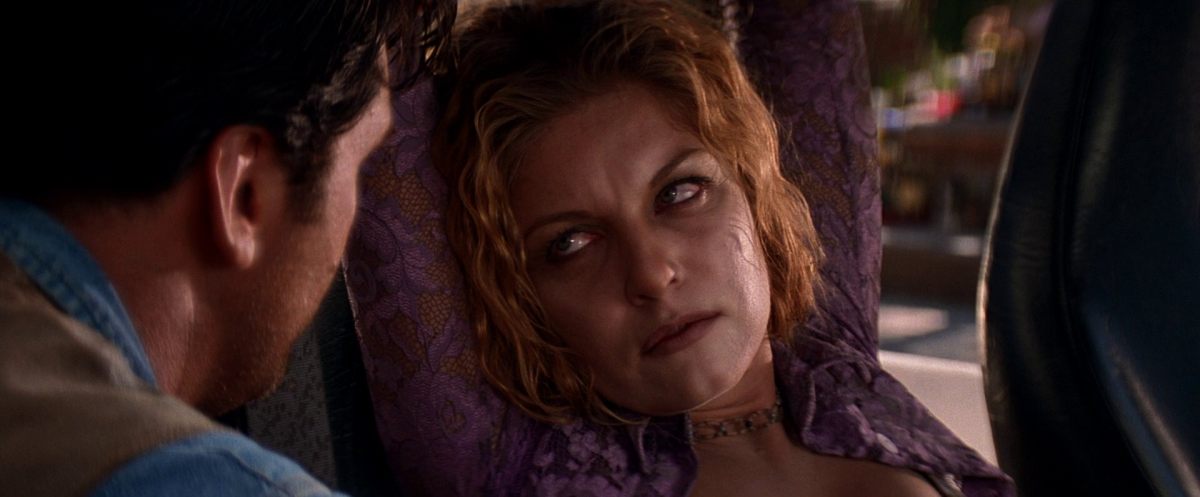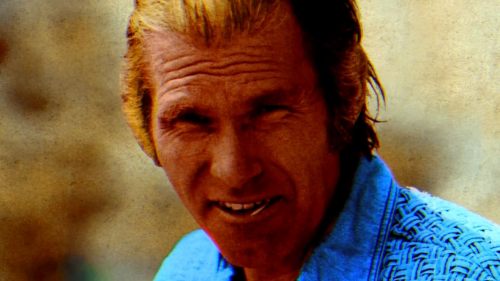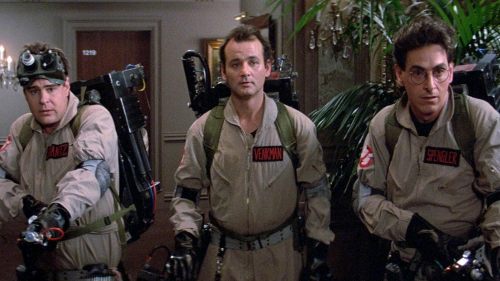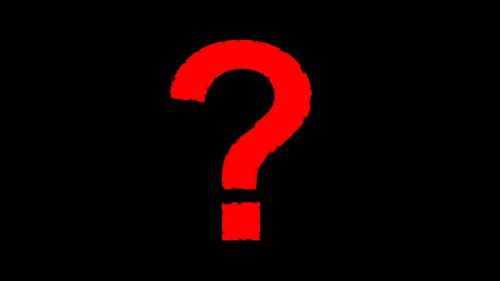Collins’ Crypt: John Carpenter’s VAMPIRES Improved On Its Source Material
Believe it or not, John Carpenter's Vampires is not only the filmmaker's sole film of the 1990s to open at #1, but it was also the only one of them to be a financial success when all was said and done. But in a way it's kind of fitting; many of the films that are considered among his best or have the most devoted fans (in particular The Thing, Big Trouble in Little China, and In The Mouth of Madness) flopped during their theatrical release, not to be appreciated until home video and cable - so it makes a weird kind of sense that one of his rare box office hits would be one of his less beloved movies. Not a "bad" film by any means, but a quick peek at Metacritic shows it to be on the lower end of his critical ranking, and - astonishingly - the absolute bottom on user ratings, and that chart includes the remakes of his films and Halloween sequels that he had nothing to do with!
Now, before you get all high and mighty with your "Well *I* think it's great!" responses, please calm down. I like the film too (I even hosted an anniversary screening of it back in the day), but it doesn't change the fact that there aren't a lot of folks who consider it to be among the director's finest hours. But that hasn't stopped Scream Factory from putting together a terrific special edition (out today!), roping in Carpenter, producer Sandy King, and yes, James Woods himself for new interviews, plus some other new goodies as well as the bonus features from the original DVD (which was one of the first I ever got, making it the first of his films I've never actually seen cropped, thank Christ). It's a pretty comprehensive look at the film's production and legacy (even the underrated DTV sequel Los Muertos comes up a bit), but one thing doesn't get covered too much: the novel it's based on.
Published in 1990, John Steakley's Vampires (aka Vampire$ - my copy doesn't have the dollar sign on it, but it's how it's usually listed) was snatched up for adaptation pretty quickly, and was once slated to be a $50m Russell Mulcahy movie starring Dolph Lundgren. When that incarnation fell apart for whatever reason, Russell and Dolph both walked away to make Silent Trigger, while the producers went to Carpenter with the scripts they had for Vampires. He took elements from both and crafted a new screenplay, got Woods to play the lead (apparently, some of his other ideas included Joe Pesci and R. Lee Ermey - I wonder how often those two, Woods and Dolph Lundgren were ever up for the same parts), and the rest is history. But with all that development time and various scripts, you might be wondering how closely did the film resemble its source material?

Turns out, not much at all. The film's first reel matches the book's first 20 pages, more or less - Jack Crow (Woods) and his team of vampire slayers wipe out a nest of ghouls using their crossbows and a truck-mounted winch that drags them out into the sunlight, then proceed to go celebrate at a motel outside of town. Their revelry is cut short, however, when a master vampire shows up and wipes out the team (plus the prostitutes they had procured for the occasion), with only Jack and one other slayer managing to escape. Minor differences aside, I'm sure any fan of the book who sat down for the movie would have been pretty happy with how faithful it was at first.
But after that, the two storylines are so different that one could film Steakley's novel faithfully and no one would ever realize it was the same story that inspired the Carpenter film, beyond a few of the character names. And even those share little resemblance to their film counterparts. Jack is more or less the same (though as written he is described as someone who looks more like Ivan Drago than Max Renn), and after the team's original "Padre" is killed in the massacre he is replaced by Father Adam (Tim Guinee in the film), but that's about it. In the novel, the character of Cat is Jack's right-hand man who survives the massacre and every other action sequence after it - in fact by the end of the book he's the only one of the team that has survived. Well in the movie, Cat appears (played by Mark Boone Junior), but he's the first to get killed when the master vampire shows up at the motel. The film's 2nd lead, Montoya (Daniel Baldwin) is an original character that does not appear in the book, though his loyalty to Jack is more or less in line with Cat's from the novel.
As for the rest of Jack's team... well, if you thought the movie's versions of these guys were underdeveloped, blame the book - if anything, their brief appearance in the film fleshes them out more than Steakley ever did. The villainous Master is a different matter entirely though; "Valek" and the black cross he was searching for are the invention of the film, as the master in the book has no discernible motive beyond just being a vampire and doing vampire-y things. He also isn't 600 years old; he's just a college-aged guy named Ross Stewart (much less cool name than Valek, I must say), and his backstory takes up a big chunk of the book's middle. Amusingly, the film and book have completely different narratives but suffer from an identical problem - the beginning and end have all the good action, with a big lull in between.

See, in the place of the film's Katrina character (played by Sheryl Lee), the book has Davette, a reporter who is doing a story on the vampire hunters and tags along with them, but Jack and everyone else seem to know something is "off" about her. Around 200 pages in, she finally spills her secret - she's under Stewart's influence, and to explain how/why she ended up posing as a reporter, Steakley shifts to her perspective (via flashback) for about 60 pages as she recounts how Ross was a guy she knew from high school that never meant much to her or anyone else, but suddenly "got hot" (so to speak) and was impossible to resist, i.e. he became a vampire. He doesn't turn her, however - just has her under his spell, which is how he can keep up with the group and know where they're heading, etc. (no, the book doesn't have the film's "evil Cardinal" subplot either).
It's not that this stuff is bad on a conceptual level; it's just that Steakley isn't the best writer in the world (he loves run-on sentences even more than I do, which is not a good thing), and this lengthy flashback disrupts the flow of a story that isn't all that compelling to begin with. He does the same thing with Felix, an old associate of Jack's who joins the team after some clumsily inserted flashbacks to explain who he is first. While the movie had the mystery of what Valek was attempting to do, and the ticking clock of Katrina's turn into a vampire (as well as Montoya's, as she bites him in turn at about the halfway point), the book has no real forward thrust beyond Jack killing Ross eventually, making it feel somewhat aimless on top of everything else. Things start to pick up in the final 70 pages or so, as the vampires attack again and cause a couple of casualties (of two characters who have no film counterpart whatsoever), but Steakley whiffs his chance to save the book as a whole by rushing through the final encounter, and revealing a puppet master villain out of nowhere before dispatching him only a few pages later, which as unsatisfying as it sounds.
Long story short, however you felt about Carpenter's film, I assure you it's an improvement on its source material. Steakley's novel has some fun characters, and the concept of a Church-backed team of vampire hunters is awesome (though the whole "$ instead of S" thing is a bit of a waste; their finances are about as significant to the narrative as the rope Michael stole from the hardware store was in Halloween), but his clunky prose and jarring POV shifts (he even briefly shifts to first-person for a flashback, despite not doing it for the others) made it a real struggle for me to get through. The movie's only an hour and forty-five minutes, and you can fold laundry or whatever if you find yourself losing interest during one of its action-less stretches, but there's not much you can do with a book that's failing to hold your attention, and even skimming its 360 pages will take longer than watching the flick. Worse, you wouldn't get Carpenter's sweet rock n roll score, or anything related to "Mahogany", two of the things that help make the movie more fun than it sounds when summarized (both movie and book are far from action-packed). Maybe it's not one of the master's best works, but it's a testament to his skill that he was able to make an entertaining movie out of such a slog of a book.



